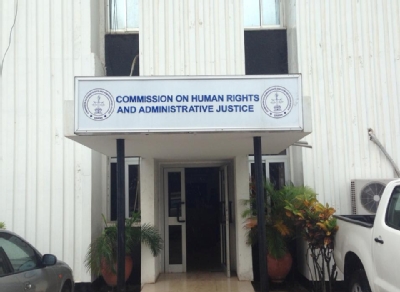CHRAJ Deputy Commissioner, Richard A. Quayson, has urged Ghanaians to move away from just talks about corruption and take action to eradicate the canker.
“We must all collectively move away from the talk, talk and act on issues of corruption, we must report incidents of corruption from our workplaces, our communities, and within the public establishment,” he said.
Mr Quayson said the Commission on Human Rights and Administrative Justice’s (CHRAJ) doors were open for people to report corrupt practices at the workplace or any public institution.
He said CHRAJ would protect the identity of the individual and conduct its investigations to ascertain the truth.
“It is only when we all open our eyes wide and other senses against corrupt practices that we can fight it,” he said.
Mr Quayson stated this at the 17th Monthly Stakeholders Engagement seminar organized by the Ghana News Agency's Tema Regional Office.
The event aimed to provide a platform for both state and non-state organizations to address national issues to enhance development.
Speaking on the topic: “Is the fight against corruption a mirage or reality, the perspective of CHRAJ,” Mr Quayson said it was time to take collective and sustained action to combat corruption.
The CHRAJ Deputy Commissioner also said amid the growing perceptions of corruption, the public had become increasingly cynical about official commitment to effectively tackle the menace.
“Confidence in the integrity of public office is fast eroding due to inadequate appreciation of the complex mix of factors implicated in corruption; lack of public participation in the development and implementation of the anti-corruption measures; and failure to foster local ownership in the formulation and implementation of the various strategies.
“Lack of effective and sustained coordination in the implementation of anti-corruption measures; and lackadaisical government commitment to, and limited support for, the implementation of anti-corruption strategies,” he noted.
Mr Quayson added that corruption in Ghana was largely nurtured and influenced by the patrimonial character of the society where informal relations, family connections and social reciprocity are reflected in levels of favouritism, cronyism and nepotism.
“The patronage system also fundamentally influences the formal system and creates contradictions between how institutions are intended to operate in principle and how informal practices supplant formal structures in reality.
“As a result, public administration and political competition often appear to be driven more by personal ties than formal rules”.
Mr Francis Ameyibor, GNA Tema Regional Manager, suggested that Civil Society Organisations (CSOs), religious bodies, professional groups, traditional authorities, gender-based groups and other interest groups must stand up and fight the corruption menace.
Latest Stories
-
Real Madrid beat Sevilla to keep pressure on leaders Atletico
13 minutes -
Liverpool put six past Spurs to go four points clear
15 minutes -
Manchester United lose 3-0 at home to Bournemouth yet again
18 minutes -
CHAN 2024Q: ‘It’s still an open game’ – Didi on Ghana’s draw with Nigeria
27 minutes -
CHAN 2024Q: Ghana’s Black Galaxies held by Nigeria in first-leg tie
1 hour -
Dr Nduom hopeful defunct GN bank will be restored under Mahama administration
2 hours -
Bridget Bonnie celebrates NDC Victory, champions hope for women and youth
2 hours -
Shamima Muslim urges youth to lead Ghana’s renewal at 18Plus4NDC anniversary
3 hours -
Akufo-Addo condemns post-election violence, blames NDC
3 hours -
DAMC, Free Food Company, to distribute 10,000 packs of food to street kids
5 hours -
Kwame Boafo Akuffo: Court ruling on re-collation flawed
5 hours -
Samuel Yaw Adusei: The strategist behind NDC’s electoral security in Ashanti region
5 hours -
I’m confident posterity will judge my performance well – Akufo-Addo
5 hours -
Syria’s minorities seek security as country charts new future
6 hours -
Prof. Nana Aba Appiah Amfo re-appointed as Vice-Chancellor of the University of Ghana
6 hours

